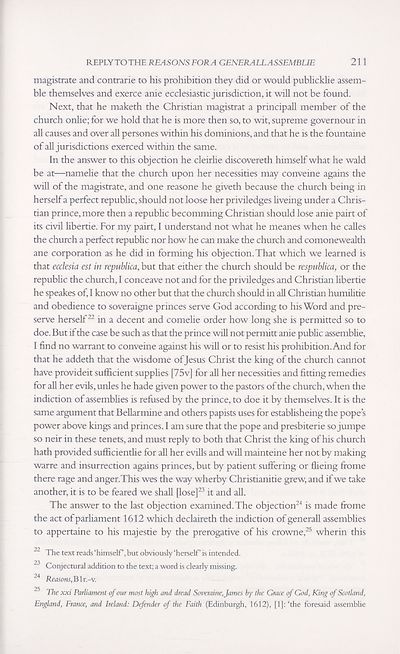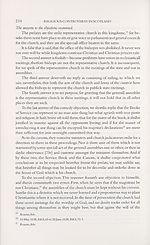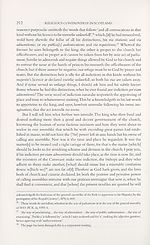Series 5 > Religious Controversy in Scotland 1625-1639
(226) Page 211
Download files
Complete book:
Individual page:
Thumbnail gallery: Grid view | List view

REPLYTOTHE REASONS FORA GENERALLASSEMBLIE 211
magistrate and contrarie to his prohibition they did or would publicklie assem¬
ble themselves and exerce anie ecclesiastic jurisdiction, it will not be found.
Next, that he maketh the Christian magistral a principall member of the
church onlie; for we hold that he is more then so, to wit, supreme governour in
all causes and over all persones within his dominions, and that he is the fountaine
of all jurisdictions exerced within the same.
In the answer to this objection he cleirlie discovereth himself what he wald
be at—namelie that the church upon her necessities may conveine agains the
will of the magistrate, and one reasone he giveth because the church being in
herself a perfect republic, should not loose her priviledges liveing under a Chris¬
tian prince, more then a republic becomming Christian should lose anie pairt of
its civil libertie. For my pairt, I understand not what he meanes when he calles
the church a perfect republic nor how he can make the church and comonewealth
ane corporation as he did in forming his objection. That which we learned is
that ecclesia est in republica, but that either the church should be respublica, or the
republic the church, I conceave not and for the priviledges and Christian libertie
he speakes of, I know no other but that the church should in all Christian humilitie
and obedience to soveraigne princes serve God according to his Word and pre¬
serve herself22 in a decent and comelie order how long she is permitted so to
doe. But if the case be such as that the prince will not permitt anie public assemblie,
I find no warrant to conveine against his will or to resist his prohibition. And for
that he addeth that the wisdome of Jesus Christ the king of the church cannot
have provideit sufficient supplies [75v] for all her necessities and fitting remedies
for all her evils, unles he hade given power to the pastors of the church, when the
indiction of assembhes is refused by the prince, to doe it by themselves. It is the
same argument that Bellarmine and others papists uses for establisheing the pope’s
power above kings and princes. I am sure that the pope and presbiterie so jumpe
so neir in these tenets, and must reply to both that Christ the king of his church
hath provided sufficiendie for all her evills and will mainteine her not by making
warre and insurrection agains princes, but by patient suffering or flieing frome
there rage and anger. This wes the way wherby Christianitie grew, and if we take
another, it is to be feared we shall [lose]23 it and all.
The answer to the last objection examined.The objection24 is made frome
the act of parliament 1612 which declaireth the indiction ofgenerall assembfies
to appertaine to his majestic by the prerogative of his crowne,25 wherin this
22 The text reads ‘himselT, but obviously ‘herselF is intended.
23 Conjectural addition to the text; a word is clearly missing.
Reasons,Blr.-v.
25 The xxi Parliament of our most high and dread Soveraine, James by the Grace of God, King of Scotland,
England, France, and Ireland: Defender of the Faith (Edinburgh, 1612), [1]: ‘the foresaid assemblie
magistrate and contrarie to his prohibition they did or would publicklie assem¬
ble themselves and exerce anie ecclesiastic jurisdiction, it will not be found.
Next, that he maketh the Christian magistral a principall member of the
church onlie; for we hold that he is more then so, to wit, supreme governour in
all causes and over all persones within his dominions, and that he is the fountaine
of all jurisdictions exerced within the same.
In the answer to this objection he cleirlie discovereth himself what he wald
be at—namelie that the church upon her necessities may conveine agains the
will of the magistrate, and one reasone he giveth because the church being in
herself a perfect republic, should not loose her priviledges liveing under a Chris¬
tian prince, more then a republic becomming Christian should lose anie pairt of
its civil libertie. For my pairt, I understand not what he meanes when he calles
the church a perfect republic nor how he can make the church and comonewealth
ane corporation as he did in forming his objection. That which we learned is
that ecclesia est in republica, but that either the church should be respublica, or the
republic the church, I conceave not and for the priviledges and Christian libertie
he speakes of, I know no other but that the church should in all Christian humilitie
and obedience to soveraigne princes serve God according to his Word and pre¬
serve herself22 in a decent and comelie order how long she is permitted so to
doe. But if the case be such as that the prince will not permitt anie public assemblie,
I find no warrant to conveine against his will or to resist his prohibition. And for
that he addeth that the wisdome of Jesus Christ the king of the church cannot
have provideit sufficient supplies [75v] for all her necessities and fitting remedies
for all her evils, unles he hade given power to the pastors of the church, when the
indiction of assembhes is refused by the prince, to doe it by themselves. It is the
same argument that Bellarmine and others papists uses for establisheing the pope’s
power above kings and princes. I am sure that the pope and presbiterie so jumpe
so neir in these tenets, and must reply to both that Christ the king of his church
hath provided sufficiendie for all her evills and will mainteine her not by making
warre and insurrection agains princes, but by patient suffering or flieing frome
there rage and anger. This wes the way wherby Christianitie grew, and if we take
another, it is to be feared we shall [lose]23 it and all.
The answer to the last objection examined.The objection24 is made frome
the act of parliament 1612 which declaireth the indiction ofgenerall assembfies
to appertaine to his majestic by the prerogative of his crowne,25 wherin this
22 The text reads ‘himselT, but obviously ‘herselF is intended.
23 Conjectural addition to the text; a word is clearly missing.
Reasons,Blr.-v.
25 The xxi Parliament of our most high and dread Soveraine, James by the Grace of God, King of Scotland,
England, France, and Ireland: Defender of the Faith (Edinburgh, 1612), [1]: ‘the foresaid assemblie
Set display mode to:
![]() Universal Viewer |
Universal Viewer | ![]() Mirador |
Large image | Transcription
Mirador |
Large image | Transcription
Images and transcriptions on this page, including medium image downloads, may be used under the Creative Commons Attribution 4.0 International Licence unless otherwise stated. ![]()
| Scottish History Society volumes > Series 5 > Religious Controversy in Scotland 1625-1639 > (226) Page 211 |
|---|
| Permanent URL | https://digital.nls.uk/127330677 |
|---|
| Description | Over 180 volumes, published by the Scottish History Society, containing original sources on Scotland's history and people. With a wide range of subjects, the books collectively cover all periods from the 12th to 20th centuries, and reflect changing trends in Scottish history. Sources are accompanied by scholarly interpretation, references and bibliographies. Volumes are usually published annually, and more digitised volumes will be added as they become available. |
|---|


